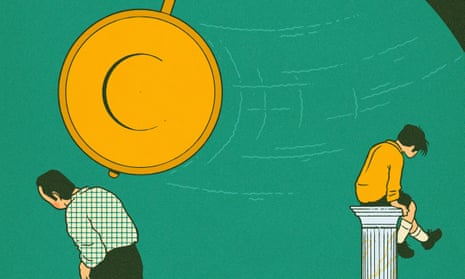Lord Bramall, the former chief of defence, has complained to the police about how they investigated a claim against him of child abuse. His home was raided last March as part of a Metropolitan police inquiry into an allegation dating back to the 70s and 80s. All charges were dropped 10 months later, and Bramall accuses the Met of failing to follow up leads and alibis that could have exonerated him months before.
But there was a more profound complaint underlying the question of competence: “I just don’t see how a level-headed policeman could believe one word of it – without corroboration, which he did not bother to get. It was I who had to prove that I couldn’t have done it.”
The case is unusual because of the defence role Bramall held at the time of the alleged abuse: his phone calls and meetings were monitored, so it would appear he could prove, more or less, where he was every second of every day.
There are two features of the sexual abuse of children that make this criminal territory treacherous; pitted with contradiction and collective self-deceit. First, abusing children is vile to the point of being incomprehensible – so repellent that the “level-headed person” proves their level-headedness by not believing it. Second, it is generally the word of one person against another, and the most a victim can hope for in seeking justice is that his or her abuser victimised other people as well.
Yet we know it does happen – and if it happens at all then every victim making an allegation must be taken seriously. But at the same time, given our collective horror over the crime, once somebody has been accused they stay accused. They are cast out of the realm of the imaginable. The reputational damage is profound and irreversible and, whatever the verdict, the sentence is passed the minute the allegation is taken seriously.
Consequently we never appear to make any progress towards dispassionate justice, instead swinging on this pendulum – from the bad old days when police would return victims to their abusers, a helpful bobby recounting the charges to the perpetrator, thinking it a “family matter”, to the present that Bramall describes, in which the presumption of innocence has been replaced by the impossibility of exoneration.
Every time an allegation is made that is not proved, it is taken as proof that due process has not been observed. Every time a historical allegation stands up, especially one against a paedophile who abused serially, the horror of it becomes more difficult to accommodate, to fit into one’s vision of a benign world.
Last week I interviewed four people who were abused as children: it was by chance – I wasn’t writing about sexual abuse. One was an interview with a personality who was repeatedly raped by her brother. One was a writer, abused in a public school. One was for a housing story. And one was an activist; she was raped over a period of years by her father.
One male victim, three female. One predator taking advantage of an institution, three abusing family members. I’m guarding against thinking this happens all the time, like the A&E nurse who thinks everyone in the country is a problem drinker. But whatever the true incidence it’s clearly not “never”. Just because we find it hard to accept doesn’t mean it doesn’t happen. The next thing that struck me was how devastating it is to press charges: within a family, it is permanently destructive. Even to say it to anyone, in a relatively positive-case scenario, splits the family down the middle, half believing the accuser, half the accused. In the worst case, your family never speaks to you again.
This doesn’t mean false allegations of child abuse never occur: they are a documented, though not prevalent, factor in high-conflict divorces. But those are generally made by one parent about the other. Children rarely make these false claims.
Has an adult ever made a false historical claim? Of course. We cannot say every acquittal has been a mistake. It is simply useful, when considering the matter as a whole, to think of the destruction it wreaks in the victim’s life to bring this to court – psychological as well as social, permanent and life-altering.
When the abuse has been within an institution, the pressures are different but the stakes are still dauntingly high: one is held liable for all the trust that has been stripped from the institution, which is particularly marked in charges against the church.
But that fact of being exiled from the world of normality and respectability applies to the abused as much as it does to the abuser. This is rarely ever said: there is simply a tacit change in one’s status, a new question mark over one’s credibility. This is before you even consider the court case itself, the fallout from openness, the tactical mendacity of those who, for reasons of guilt or squeamishness, don’t want to hear you.
The pianist James Rhodes – who was raped as a child and then had to fight in court to publish his memoir because his ex-wife claimed it would damage their son – told me last year: “I don’t think anyone I have ever met could name one of the victims of Savile or Rolf Harris. We never get any fucking airtime.”
The other thing that struck me, listening to the activist, was my own natural tendency to disbelief: she told me she was raped by her father (whom she had never prosecuted), and of course I believed her. But then she told me about a fellow activist who was apparently bred for the purposes of abuse; when she finally escaped, the police took her back to the family who abused her.
My first response was disbelief: who would have a child in order to sexually abuse it? What possible interruption of human instinct would have to occur for that to be possible? Yet my incredulity is driven by what I need to believe of other people, of the species; it has nothing to do with that woman or her case. Often the failure to hear these claims dispassionately has an element of group narcissism, in which it is more important to maintain a collective delusion than it is to discover the truth.
In 2013, when Keir Starmer was director of public prosecutions, he revolutionised the way in which sex crimes were approached, by asking a series of simple questions: what do we ask of victims before we will take them seriously? Are we asking them to report the crime immediately, not a decade later? Are we asking them to have clear, consistent, consecutive memories, unblurred by time and trauma? Are we asking them to be perfect, to be demure, to be drug and alcohol free, to be likeable? And to all those requirements, in the case of children, are we asking that the crime perpetrated against them should not be too grotesque before we will consider its veracity? And if we’re raising all these hurdles to justice, are we excluding those who deserve and need it?
Both the accuser and the accused would be better served if we could reach some new normal, in which our need to believe in human goodness came second to the pursuit of justice.

